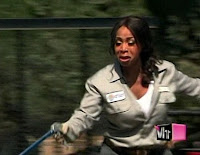
The movie itself is difficult to take seriously, mostly because of the absurd premise that directors barely even attempt to rationalize. In the new millennium, the corrupt government, attempting to crack down on the increasingly disruptive youth, passes a law that requires one selected junior high class of fifteen year olds to be taken to an island and enter a “Battle Royale.“ 41 children, armed with maps, food, and one random weapon, must fight to the death until one remains. If no winner emerges after three days, the collars placed on everyone’s neck explode, killing them. Ready? Go.
Battle Royale is simply an exploration of how these children choose to play the game. Some hide, some kill themselves in protest, some work together, and some choose to be assassins. Strategies and alliances play out in a way not so different from Real World/Road Rules challenges, and no one can be trusted. After every death scene, the movie displays updates on recent eliminations and how many remain. The game is compelling in and of itself, but watching teenagers slit each other’s throats and jump off cliffs adds, well, shock factor too. This bloodbath of innocents is obviously not meant for the squeamish, or for the Japanese government, but someone digs it - at the Japanese Academy Awards, the film was nominated for best picture in 2001.
Battle Royale can’t really be considered a reality program, but it is really is just the most extreme version of the reality formula. And despite the ridiculousness of the basic premise, the vapidity of the ending, or the convoluted and unnecessary flashback sequences, the movie is largely successful just based on the elimination structure and shocking content. I hesitate to call it a logical next step in the realm of shows like Fear Factor or MXC, but it does seem to evoke some of the same thoughts - “what would I do if I were in that game?” or “how much of my humanity would I give up for the prize?” (in this case, not dying.) Still,
Either way, despite the shortcomings, I personally found myself thoroughly captivated while watching Battle Royale, and if you think you can stomach it, it’s worth most of the two hours.
Reuben Moss



